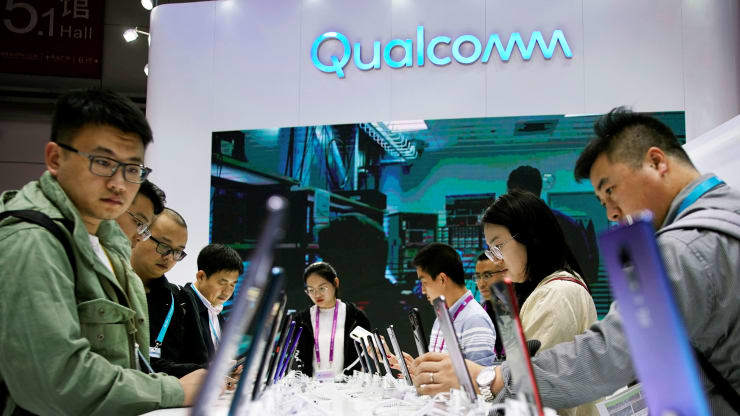This shows that a large number of smartphones sold next year will support 5G, not just high-end niche devices currently on the market.
Editor’s note: This article comes from Tencent Technology .

Strategy
-
Qualcomm expects that all high-end Android phones using its chips will support 5G networks next year.
-
On Tuesday, local time, Qualcomm announced the launch of two 5G-enabled chips that smartphone makers will use on millions of Android phones.
-
This indicates that a large number of smartphones sold next year will support 5G, not just high-end niche devices on the market today.
December 5, according to foreign media reports, Keith Kressin, senior vice president of product development for chip giant Qualcomm, said in an interview a few days ago that the company expects all high-end products using its chips in 2020. Android phones will support 5G networks.
Krissing said: “By 2020, all high-quality chips we sell will support 5G, so every high-end phone that uses them will also support 5G networks.”
On Tuesday in the United States, Qualcomm announced that it will launch a new top-end chip, Snapdraon 865, in 2020, which will be sold to mobile phone manufacturers for use in high-end Android phones such as Samsung Galaxy or Google Pixel. Qualcomm said that the Snapdraon 865 will only be used in new 5G equipment and will be integrated with another 5G modem, X55, which is also sold by Qualcomm and is a necessary component to provide 5G services.
Qualcomm also released a lower-priced, slightly slower chip, Snapdragon 765, which can also integrate 5G modems.
5G wireless technology can provide faster speeds and lower latency, thereby bringing better cellular network services to consumers. But it’s also of strategic importance for Qualcomm, which has patented many 5G technology’s basic systems and sells them as marketsBest 5G cellular components and modems. Even Apple, which makes its own processor for mobile phones, recently signed a multi-year agreement to use Qualcomm’s 5G modem, ending a years-long legal battle between the two companies.
By integrating 5G modems with chips that will eventually be used in millions of mobile phones, Qualcomm signals that a large number of smartphones sold next year will support 5G, not just the high-end currently supporting next-generation networks Niche equipment. If enough people use 5G mobile phones, consumer demand may stimulate operators to speed up the construction of 5G networks.
Qualcomm announced last month that 200 million 5G mobile phones will be shipped to retailers in 2020. Another estimate by analysts at J.P. Morgan this week estimated that 229 million 5G handsets will be shipped in 2020 and will increase to 462 million in 2021.
Designing chips is difficult. Among the top smartphone manufacturers, only Apple, Samsung, and Huawei design their own chipset for high-performance devices, and some high-end phones of Samsung still use Qualcomm chips. Instead, most smartphone makers tend to build mid- to high-end devices around Qualcomm processors and Google’s Android operating system, allowing brands to focus on marketing and software adjustments. Last year, phones from companies such as LG, Xiaomi, OPPO, Nokia, Google, and Samsung all used Qualcomm processors.
Data released by market research company Strategy Analytics shows that when other companies make competitor “system chip” products for mobile phones, Qualcomm still occupies a dominant position with 40% of market revenue. This means that the hardware features supported by these chips will become a selling point for mobile phones throughout the year and may penetrate into budget-priced chips that Qualcomm will launch later.
The chip used to be judged by the CPU speed and the number of cores, but most of the improvements of this year’s Qualcomm chip are achieved through a new process. In this process, repeated specialized tasks are given their own custom “blocks” on the chip. Crissing explains that this approach is the way chip performance has improved dramatically in recent years, as advances in transistor manufacturing technology that are driving Moore’s Law are slowing.
A key hardware feature of Qualcomm chips this year is improved dedicated hardware, called Hexagon, for artificial intelligence applications. Instead of having the CPU handle each task, Krising said, it can load specific AI problems onto a “silicon block” specifically designed to calculate those problems. For consumers, this means better pictures. Krising pointed out: “Many use cases are related to cameras, enhanced pictures, object recognition, blurred backgrounds, auto portrait mode and so on.”
Qualcomm is not the only company to integrate specialized machine learning hardware into mobile phones. Apple designed and built its own mobile phone processor, which has an integrated AI processing component called a “neural engine.” NVIDIA, IntelAnd many startups are making similar artificial intelligence chips for servers. (Tencent Technology Review / Golden Deer)